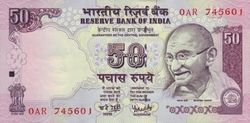You have to chase the Rupee!
 Suppose you and me went to buy a gift for our friend's birthday. The shop's owner was not present at that time but there was one of his servants. We bought an article worth
. We both paid
each.
Suppose you and me went to buy a gift for our friend's birthday. The shop's owner was not present at that time but there was one of his servants. We bought an article worth
. We both paid
each.
After sometime, the shop's owner came and told the servant that it was actually a article. He ordered the servant to return to us. On his way us he took and returned to us. We both shared it as each.
Now amount paid by each of us
And total amount paid by us
If we add the money taken by the servant and which he returned us,
Then, total money
But wait a minute, from where had an extra came ?
This section requires Javascript.
You are seeing this because something didn't load right. We suggest you, (a) try
refreshing the page, (b) enabling javascript if it is disabled on your browser and,
finally, (c)
loading the
non-javascript version of this page
. We're sorry about the hassle.
In reality the 1 R u p e e does not exist. Because if we are paying R s . 2 3 each then we're contributing R s . 0 . 5 each for the R s . 1 which had been taken by the servant. So the R s . 1 taken by the servant should not be added while totaling the money. Therefore, the answer is that the R s . 1 taken by the servant was counted twice.